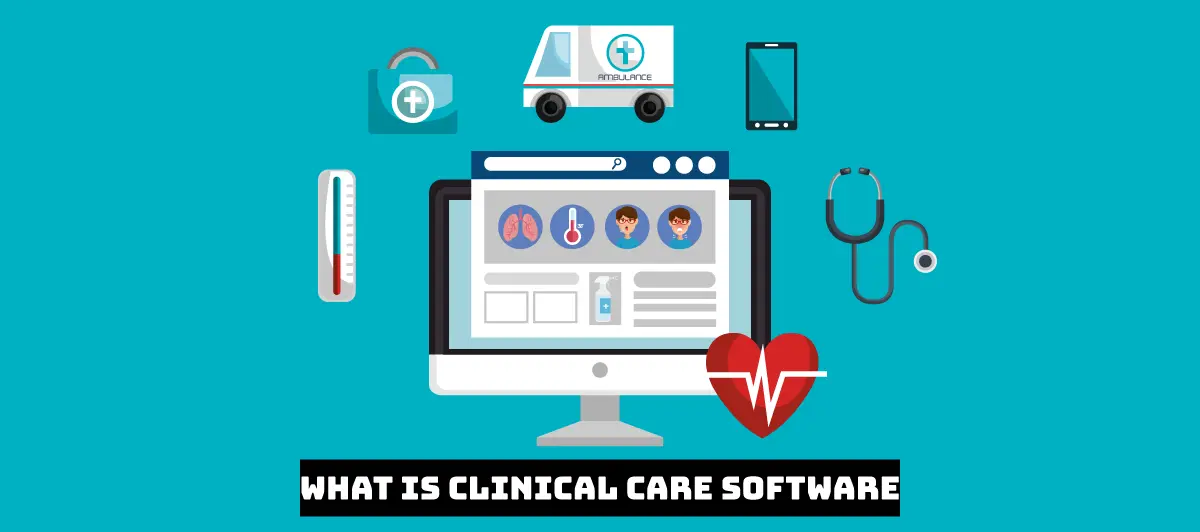What Is Clinical Care Software: All You Need To Know
Quick Summary: It would be best if you learned all about what makes your clinical care more efficient. In this article, you will read all about What is clinical care software, its importance, and its types. The clinical care software provides a range of applications and digital tools that will boost the overall efficiency of your hospital… Let’s read this article to understand everything!
Introduction
In the healthcare sector, efficient patient clinical care is mandatory, but it is not possible to function without immersive software or digital medicine tools. So, let’s review and understand what clinical care software is, how it works, and why it is essential.
The clinical care software is an innovative solution that changes and revolutionizes all healthcare practices. At its core, this software is a technological and economic boon, and it aims to simplify the healthcare process and enhance overall patient care.
This clinic management software offers various features such as EHR, EMR, doctor appointment scheduling, patient queue management, billing management, inventory management, etc. We will discuss all such features and review their types…
This software helped healthcare providers communicate and manage all their patients efficiently. Clinical care software unifies these aspects, creating seamless coordination among hospital staff. It has digital hub function to handle patient data. No error has been found in data accuracy or security. Therefore, such a transformative advancement augments administrative side of healthcare and benefits the final outcome as well.
Let’s dive more deeply into the sea of knowledge!
What Is Clinical Care?
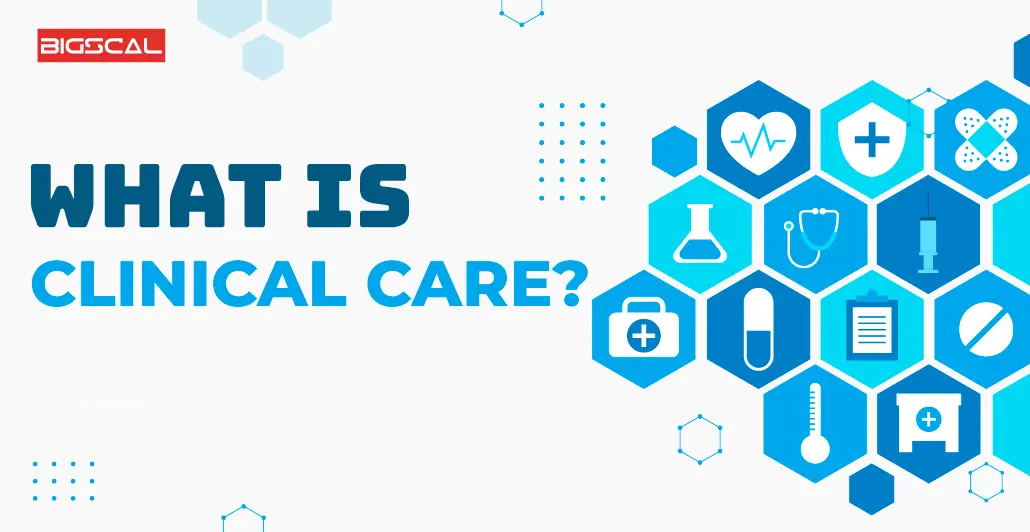
Clinical care can be defined as medical attention provided to those in the form of medical services, treating medicines, and therapeutic support to individuals with health concerns. It covers the range of medical functions like diagnosis, prophylaxis, and therapy which are involved in various diseases management. As for clinical care, it is typically provided by doctors, nurses and other related health care professionals within the healthcare settings, including hospitals, clinics and private rooms. Clinical care is directed to the purposes of encouragement and preservation of patients by attending to their disease conditions.
What Is Clinical Care Software?
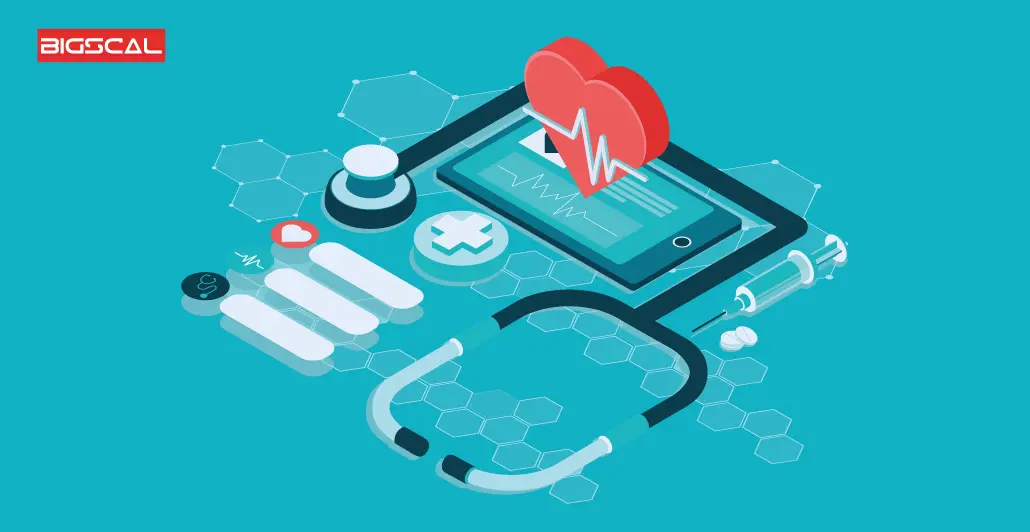
You have taken note of what means clinical care and now can know What Means Clinical Care Software. ??
In the context of clinical healthcare, software is a term that encompasses computer programs and applications that help healthcare providers handle patient care. This type of software allows to simplify and automate many different aspects of the clinical workflow process, including record keeping, scheduling, payment services, and communication inside the care team.
Although technology has vastly affected healthcare, it can bear impressive fruits. The software packages this technology has created comprises of clinical care software, electronic health records (EHR), patient scheduling systems, billing, and invoice tools, and information communication technology for healthcare providers.
Types Of Clinical Care Software
There are various types of clinical management software, see below:
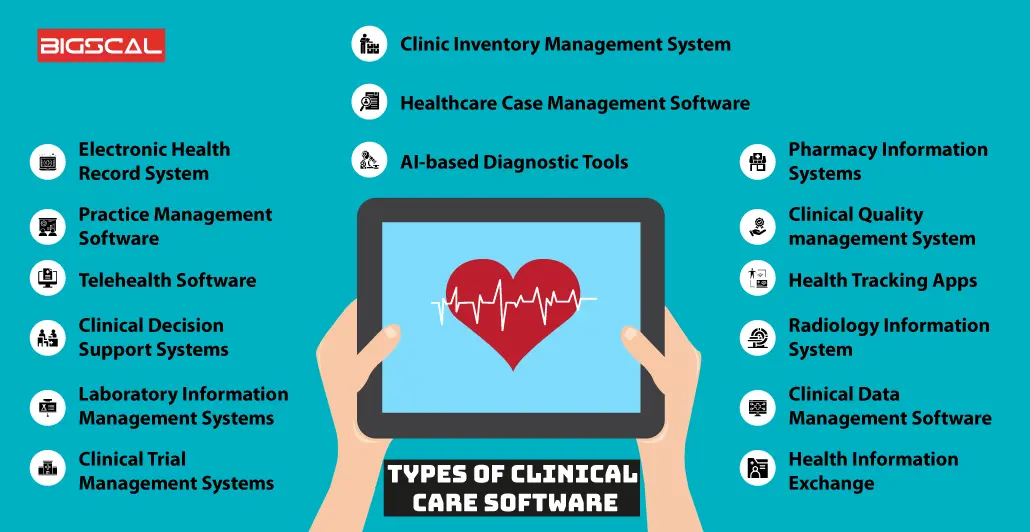
- lectronic Health Record (EHR) Systems
- Practice Management Software
- Telehealth Software
- Clinical Decision Support Systems (CDSS)
- Laboratory Information Management Systems (LIMS)
- Clinical Trial Management Systems (CTMS)
- Pharmacy Information Systems
- clinical quality management system
- Radiology Information System (RIS)
- clinical data management software
- Health Information Exchange (HIE) Systems
- clinic appointment management system
- Picture Archiving and Communication System (PACS)
- Clinic inventory management system
- Healthcare case management software
- AI-based Diagnostic Tools
- IoT Devices
- Health Tracking Apps
Benefits Of Implementing Clinical Care Software
The clinical care software and healthcare software benefits doctors, clinicians, physician assistants, patients, the hospital in various ways. Read below:
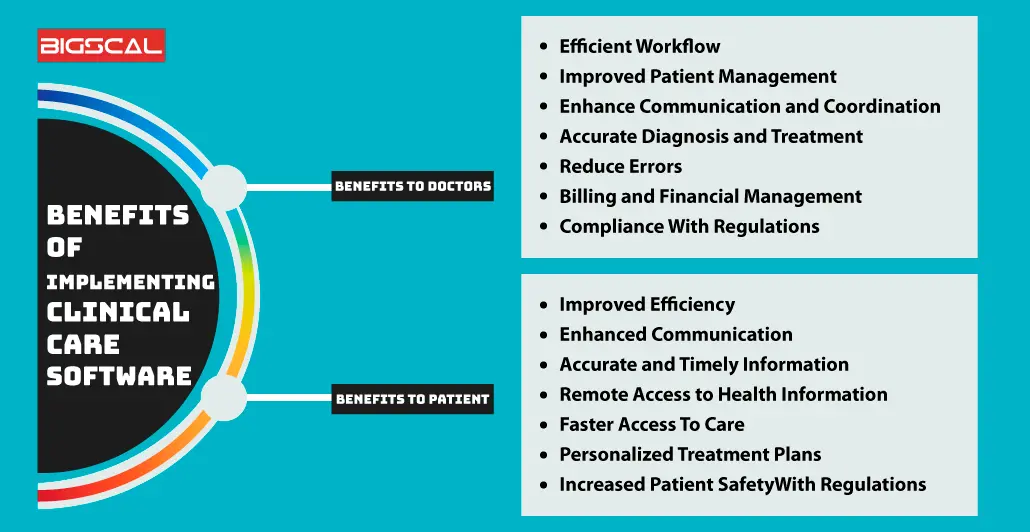
Benefits to Doctors:
Efficient Workflow
Clinical care software streamlines the daily tasks of doctors, enhancing their efficiency. It replaces traditional paper-based methods with digital tools, allowing for swift access to patient information, medical histories, and treatment plans. With a few clicks, doctors can update records, prescribe medications, and schedule appointments.
This not only saves time but also reduces the likelihood of errors associated with manual record-keeping. The software’s intuitive interface enables seamless navigation, enabling doctors to focus more on patient care and less on administrative tasks.
Improved Patient Management
Clinical care software revolutionizes how doctors manage patient information. It provides a centralized platform to access comprehensive patient records, facilitating better-informed decision-making. Doctors can quickly retrieve medical histories, test results, and treatment plans, leading to more accurate diagnoses and personalized care.
The advanced communication capabilities allow for collaboration between the different categories of healthcare professionals thereby promoting a coordinated approach to the dealing with the patient’s issues in question. Besides, Computerized alerts and reminders increase ordering efficiency, thus decreasing possible overlooked or completely missed appointments.
Enhance Communication and Coordination
Clincal software enables exchanging information and instructions in an agreeable manner, which promotes cooperation between medical professionals. By using a systematic approach to patient care, physicians can share the medical information with colleagues (using EHRs), which leads to improvement of physician teamwork. Under this approach, the healthcare professionals work together as a team in addressing the health conditions of the patients, hence minimizing the risks of misinterpretations and encouraging agreed choices.
Furthermore, instant access to the updated patient records ensures that the doctors have knowledge on treatment protocols hence cannot prescribe treatments that have been discontinued. This helps in the continuing of care without interruptions as well as maintains the consolidation of information about the patient.
Accurate Diagnosis and Treatment
Clinical care software is a tool which supports healthcare professionals to keep records more accurate and this assists to deliver more precise diagnoses and effective treatments. The system allows physicians to recall all the patient’s history, examine the laboratory results and the latest data.
This general view is valuable in finding a correct diagnosis by considering all available information works the physicians. On the other hand, this computer software often includes diagnostic tools and decision support systems that are being used by the doctors to make better decisions.
Reduce Errors
Patient care programs provided by the clinical software system dramatically decrease possible miscalculations in medical workflow. By means of automatic systems, it eliminates unintentional errors of such a nature as recording of patient information and the prescribing of drugs.
Through standardizing data input and extraction by physicians it guarantees the accuracy in the medical record keeping all together leads to the boost of patient safety. This workflow is pivotal for all doctors because they are enabled to dedicate the greater part of their work towards their duties of providing quality care and at the same time reduce the risk of mistakes that might be costly in terms of life.
Billing and Financial Management
Healthcare software offers doctors a streamlined solution for billing and financial management. It automates the billing process, reducing the risk of billing errors and ensuring timely and accurate invoicing for services rendered.
This not only saves time but also improves the financial efficiency of the medical practice. This aspect allows doctors to concentrate on patient care while maintaining a well-organized and financially stable practice.
Compliance With Regulations
Clinical care software ensures doctors adhere to healthcare regulations, streamlining their practice with legal requirements. This technology automates tasks like documentation, billing, and record-keeping.
These reduce the risk of errors and ensure that all aspects of patient care comply with established standards. Providing a well defined and structured framework helps doctors stay organized and up-to-date with regulatory changes, ultimately promoting a secure and compliant healthcare environment.
Data Analytics
This software helps doctors with data analytics tools, transforming raw patient information into valuable insights. This enables healthcare professionals to make informed decisions, identify trends, and enhance patient outcomes.
With real-time analytics, doctors can monitor patient progress, evaluate the effectiveness of treatments, and proactively address emerging diseases and health patterns.
Patient Engagement
Clinical care software enhances patient engagement by providing a platform for streamlined communication. Doctors can share important health information, appointment reminders, and personalized care plans directly through the software.
Patients can access their medical data, schedule appointments, and receive educational resources, promoting active involvement in their healthcare journey.
Remote Access
Clinical management system modules software offers doctors the convenience of remote access to patient data.
This flexibility enables doctors to monitor and adjust patients’ care even when outside the clinic, improving efficiency and responsiveness. Remote access also facilitates telemedicine consultations, allowing doctors to provide timely medical advice, assessment and support, which is especially valuable in situations where in-person visits with specialists may be challenging or impractical.
Benefits to Patient:
Improved Efficiency
Clinical care software enhances efficiency in patient care. Through streamlined processes and digital record-keeping, healthcare providers can access patient information promptly, reducing time spent on paperwork. Electronic Health Records (EHR) facilitate quick data retrieval, allowing medical professionals to make informed decisions promptly. Automation of routine tasks, such as appointment scheduling and prescription management, further contributes to operational efficiency.
This translates to shorter wait times for patients, quicker diagnosis, and, ultimately, improved overall healthcare experience. In summary, clinical care software optimizes workflows, ensuring healthcare teams and clinicians can focus more on patient care and less on administrative tasks.
Enhanced Communication
Implementing clinical care software promotes seamless communication among healthcare professionals and stakeholders, benefiting both patients and providers. Electronic communication tools integrated into the software enable instant sharing of critical information, fostering collaboration among different departments and care teams.
This enhances care coordination, ensuring that all involved parties stay informed about a patient’s medical condition, treatment plans, and progress.
Communication packages may as well include patients who can receive their health providers through private messaging systems.
This accessibility gives a bit more room for patient-centered care where persons feel valued and responsibe in their health care.
Accurate and Timely Information
Clinical care software regulates that patient details at the end of the day are complete and easily retrieved by medical experts. When electronic medical records (EMRs) are put where you can access them directly and be transcribed automatically, computerization of patient data significantly reduces the possibility of typographical errors.
This timely input on the right patient provides better diagnosis, assessments and treatment, thereby making it possible to ultimately improve patients’ outcomes. The result is highly efficient care delivery.
Remote Access to Health Information
Patients can use a clinical care software to access their health information even when they are not physically present at the hospital using electronic means of communication. Aiming at the fact that users have access to the electronic data of medical records, test results and treatment plans anywhere at any time eases the stress related to the need for additional check-ups and hospital visits.
By this, health care becomes more available to patients, which activates patient engagement and empowerment, hereby allowing them to be actively involved in their health care. Furthermore, the remote access during the emergencies and second opinions online assures that the medical practitioners have immediate access to very crucial patients’ information and hence the doctors can be able to decide within a very short time in any situation regardless of the location.
Reduced Errors
Clinical care program integration decreases the chances of erroneous treatment mistakes. The use of Artificial Intelligence (AI) in healthcare involves advancements in different functions like prescription management and medical records, thereby cutting the likelihood of medical procedure mistakes.
Automated application systems provide for scrapping handwritten prescriptions thus pat guarantees the correct administration of drugs and medicines.
Personalized Treatment Plans
Clinical care software facilitates the creation of personalized treatment plans tailored to each patient’s unique needs. With access to comprehensive electronic health records, healthcare providers can analyze individual health data more efficiently.
This enables them to develop targeted treatment strategies, considering specific medical histories, genetic factors, and lifestyle choices.
Increased Patient Safety
Clinical care software enhances patient safety by reducing the likelihood of medical errors. Through features like electronic health records (EHRs), healthcare providers can access comprehensive and accurate patient information, including medical history and prescribed medications.
It negates the risk of manual records and appeals the clinical professionals with the most updated information at their beck and call.
Faster Access To Care
The healthcare software and its implementation make it easier for people to get health care services. As a result, it eventually leads to health improvement among patients. Interfacing with electronic systems, healthcare providers will be able to tremendously improve how medical operations are carried out mainly adding to the efficiency in handling appointments, streamlining of administrative tasks as well as the prompt access of patient records.
It follows in return that patients’ waiting time decreases which gives them prompt diagnosis and treatment plans. In addition, the efficiency of the healthcare system gets better. In the end, increased with appointments should mean that patient approval and maybe even chronic health conditions better management.
Patient Empowerment
This personal health record software helps patients obtain a grasp of their health data by giving them an access to different health parameters. Such openness helps to create the spirit of involvement and knowledge. This allows people to get involved in their medical care council with more power.
Nowadays, one can argue that patients whose self-efficacy is high are more likely to comply with treatment plans they have been given, have productive conversations with their doctors, and take responsible decisions concerning their health.
Efficient Prescription Management
Computer software in clinical care facilitates the writing of prescriptions, thus leading to improvement on accuracy and efficiency in the process of managing medications. It gives the health professionals the ability to maintain the complete electronic records of the prescriptions of patients, decreasing the vulnerability to errors and narrowing the possibility of having adverse drug reaction.
The skillful automated functions help in making quick prescription refills, therefore, physicians and patients save time. Furthermore, electronic prescriptions allow a direct link between the healthcare providers and the pharmacies enabling communication that guarantees the right medication will be received in a timely manner.
This efficiency not only improves patient safety but also contributes to a more organized and responsive healthcare system, ultimately enhancing the overall quality of life and patient care.
Best Clinical Care Software That Makes Patient Care More effective
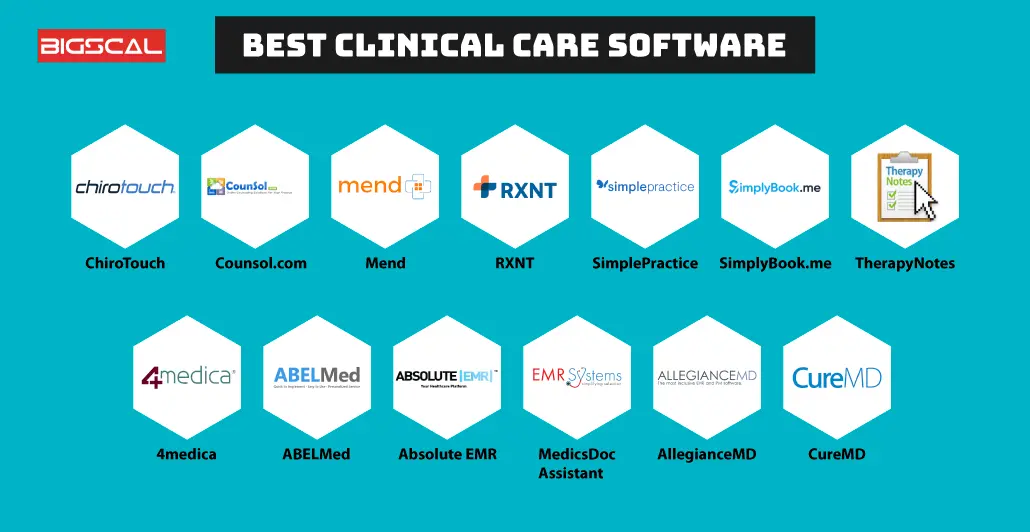
Here’s the list of Best Clinical Care Software That Makes Patient’s Care More effective. Have a look:
- ChiroTouch
- Counsol.com
- Mend
- RXNT
- SimplePractice
- SimplyBook.me
- TherapyNotes
- 4medica
- ABELMed
- Absolute EMR
- MedicsDocAssistant
- AllegianceMD
- CureMD
Develop A Clinical Care Software with Bigscal Technologies
Therefore, so whenever you desire software for you hospital or for your medical center, then you need to come us.See why:
Design of the healthcare software with us is carried out with the use of efficient and robust frameworks and scalable components which enable us to serve the voluminous healthcare data. The EHR software systems will be developed by the developers for EHR storing and retrieving purpose. This will solve the patient data storage system.
Besides this, we apply the machine learning algorithms, which could be supportive for prediction of diseases occurrence and individualized treatments.
Hence, we would focus on you so that you could excel better in serving the specific purpose.
Conclusion
Finally, here you are reading the ending of this article. So now, you know what is electronic medical record. They are available not only in the software side of the field but also in medicine. Among many other benefits they have, they automate all processes, making it so that patients are treated with care and efficiency is enhanced.
Bridging the gap between the doctors’, patients’ and administrators’ workflows depends on a variety of digital tools from EMR to appointment scheduling that contribute to a more connected and patient-centric healthcare system.
Hence, select one or amongst these softwares to come up with the ideal results.
FAQ
How do you define patient care?
Health care includes using medicine to care for persons who are ill and need specialized services. More still, it exemplifies their health and cares mentally and physically too for that matters. It involves an effective collaboration between diagnosis, support and treatment to ensure a good outcome while at the same time maintaining patient autonomy and a favorable relationship in which the patient and healthcare providers work together.
What are examples of E clinical?
E-clinical, or electronic clinical, a field of practice that becomes applicable to research activities in clinical research and healthcare delivery with digital technologies. Instance ranging from electronic health records (EHRs) to virtual platforms and trials, and digital data capturing systems are some examples. These technologies ensure accuracy, speed, and quality of data in almost all areas of clinical work and the research.
What is an example of a clinical care team?
A clinical care team may commonly include various groups of health professionals who are meant to form a united front with the main goal of rendering high-quality medical service for the patients. Through an instance of a primary health care physician, nurses, specialists (such as cardiologists or endocrinologists), pharmacists, and supportive professionals including physical therapists team up to address the medical, psychological, and holistic demands of a patient.
Clinical vs Non-Clinical Roles in Healthcare?
There are two sides to the healthcare teams- the clinical side which involves doctor and nurse roles and the other side which comprise non-clinical functions such as administration, finance, and IT. The role of doctors and nurses is directly related to the patient’s health, but, in turn, non-clinical professionals provide the necessary support for healthcare organization efforts, which, in most cases, does not entail contacts with patients.
How is patient care a human rights issue?
Access to health professional’s timely, quality assistance is a human rights issue that should be a fundamental thing. The right to health is a generally recognized and deficient or indiscriminatory patient care is something that violates such right. Implementing fair and human oriented approach based on more comprehensive foundations as human dignity and welfare. By keeping the content relevant and interesting, bloggers can build a loyal following over time.
